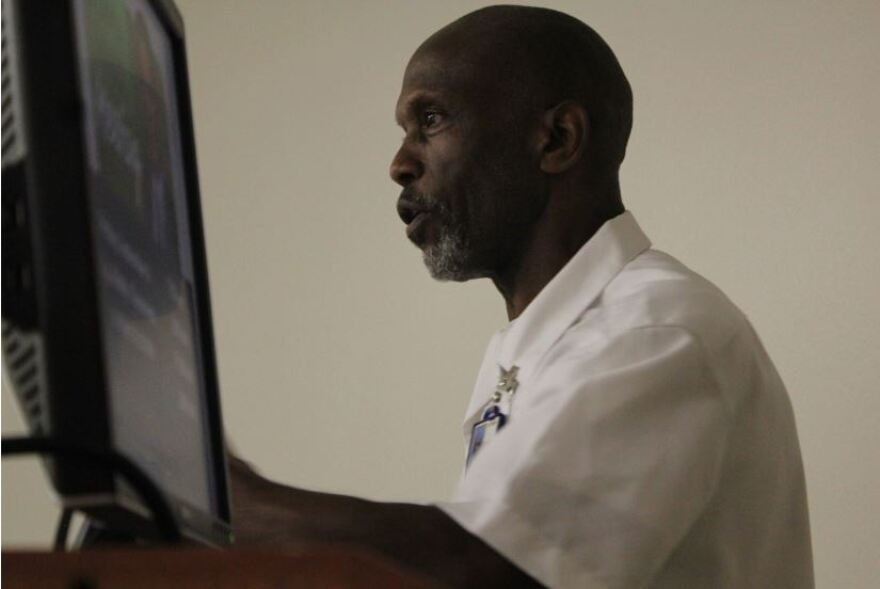The Department of Veterans Affairs is reaching out to clergy members who may find themselves counseling veterans in crisis or need. It now holds training sessions for religious leaders all over the country. One of the goals is to teach them to look for signs of psychological disorders and other issues among veterans in their congregations.
On an early morning in August, about 20 clergy members and veteran advocates mingled over coffee at the Central Texas Medical Center in San Marcos. Many of them already knew one another, and swapped stories about their work in Hays County and beyond.
One processed veterans benefits. Another worked as a counselor for veterans in hospice. A third ran a veterans fellowship in his community.
Meanwhile Barrington Malcolm, an Army veteran and VA chaplain, arranged tables and chairs in preparation for a day-long talk about ministering to veterans in crisis.
Malcolm’s connection to the training is highly personal. Since separating from the military, he’s experienced near-constant suicidal thoughts which he manages without medication. He admitted it can be difficult for veterans to seek medical help, because they fear being labeled or stigmatized.
“As a veteran — as a military person — I'm not very comfortable speaking with mental health professionals about my mental challenges,” he said. “And I do have them.”
Malcolm has developed a bevy of tools to help him stay grounded — tools he teaches other religious leaders through the VA’s Community Clergy training program. Part of his mission is to equip clergy to serve as an alternative source of care — both spiritual and practical.
“When I conduct my groups at the hospital, I let them understand: ‘Look, what I'm sharing with you is what I'm using to help me stay alive,’” he said.

“What Can We Do?”
In 2010, the Department of Veterans Affairs established the national Community Clergy Training Program to educate faith communities about how to better use their resources to support veterans and family members, especially those who feel isolated, alienated or helpless.
CCTP also aims to increase clergy’s ability to identify and ease veterans’ reintegration challenges. The program costs the department a little over $1.5 million per year, and operates in 47 states.
Chaplain Larry Collins, an Air Force and Navy veteran, works alongside Malcolm as a clergy training instructor in Texas. He said clergy want to get more involved with veterans as a population.
"I think, in general, they're aware through media of [veteran] suicide rates and so forth,” he said. “There's a genuine concern on the part of clergy across the spectrum. They wanna know, practically, ‘What can we do?’”
Clergy ask a wide range of questions about veteran-related issues, such as military sexual trauma, traumatic brain injury, stress reactions and other issues.
“Questions about how difficult it is for veterans to transition back into the civilian sector after deployments... The specifics of symptoms related to PTSD. They want to know more about moral injury,” said Collins.
The training offers tips on reducing veterans’ isolation and empathizing with veterans who may be having a stress reaction. It also outlines the major differences between military and civilian culture, and connects clergy with VA and community resources where they can refer veterans if necessary.
According to Collins, veterans value the anonymity and acceptance offered by clergy — in part because there is persistent stigma around mental health issues.
“One of the things that we discuss and talk about is this idea that spiritual care is, in its essence, total acceptance,” he said. “It's non-judgment. I believe that many of our veterans know that.”
What Does Crisis Look Like?
One of the attendees, Mark George, works as a chaplain at the Caldwell County Jail in Lockhart, Texas. He told the group he sees a lot of incarcerated veterans in extreme distress.
“They normally tell me they’re having dreams of suicide. They’re telling me that they see themselves dying this way or that way,” he explained. “I really don’t get into questions at that point. I just let them talk.”
These kinds of incidents happen a lot, George said.
“Just last week I had an individual tell me, 'I won't be here next Tuesday.'”
Malcolm stepped in with feedback: Keep them talking. Don’t leave them alone. Call the VA’s Suicide Hotline.
“Really listen,” he said emphatically. “That's the crucial part — to be able to really listen and hear. Hear what is not being said. Don't be scared to ask questions. Use your ignorance to inform you.”
For Malcolm, one of the most important things for clergy to realize is that they can connect with veterans on a personal level — even if they themselves haven’t worn the uniform or been in combat.
"The first part, I believe, is for clergy to open themselves to become vulnerable,” Malcolm said. “To recognize 'I'm a human being. I hurt too. I don't live up here in the sky without pain. I struggle too.’”
The VA trainings seem to be making a difference. Early outcomes data showed that clergy who went through the program were more likely to make referrals to the VA and other mental health providers. Attendance has risen over the last nine years — with more than 1,500 participants in 2018.
Carson Frame can be reached at Carson@TPR.org and on Twitter at @carson_frame.
This story was produced by the American Homefront Project, a public media collaboration that reports on American military life and veterans. Funding comes from the Corporation for Public Broadcasting.




